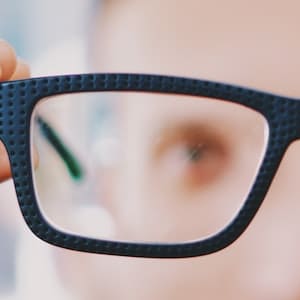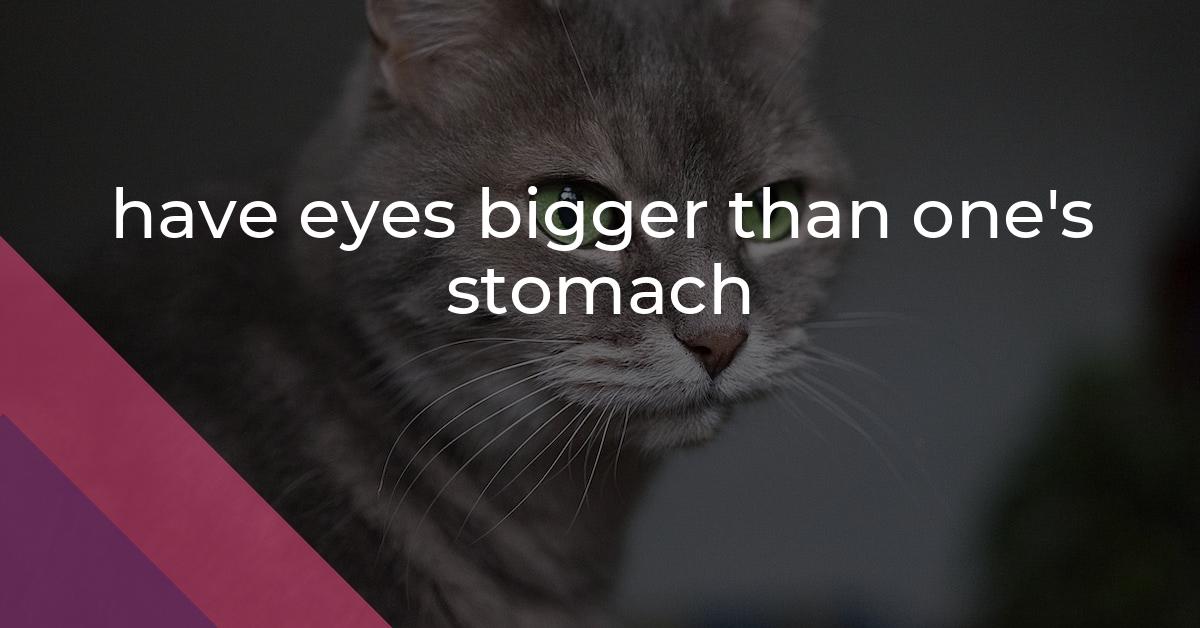have eyes bigger than one’s stomach: Idiom Meaning and Origin
What does ‘have eyes bigger than one's stomach’ mean?
The idiom "have eyes bigger than one's stomach" means to take or desire more than one can actually consume or handle.

Idiom Explorer
The idiom "one too many" means to have or consume more of something than is considered acceptable or appropriate.
The idiom "lay eyes on" means to see or look at something. It implies that the person looking at something has a strong desire or interest in it.
The idiom "I could eat a horse" means to be extremely hungry, indicating that one's appetite is so intense that they could consume a large amount of food, even as much as an entire horse.
The idiom "have eyes in the back of one's head" means to be exceptionally observant or aware of one's surroundings. It implies a heightened ability to notice things that others might miss.
The idiom "have more chins than a Chinese phone book" refers to someone who is significantly overweight and has multiple rolls of fat on their neck or chin area.
The idiom "get one's fill" means to have enough of something or to satisfy one's desire or appetite for something, usually to the point of feeling full or content.
The idiom "fill one's face" means to eat a large amount of food quickly and greedily.
The Culinary Conundrum
The idiom "have eyes bigger than one's stomach" is used to describe someone who takes more food than they can actually eat. It suggests that a person's desire for more exceeds their actual capacity or need. This idiom dates back to the mid-17th century and is still commonly used today.
It originated from the English adage "The eyes are bigger than the belly," which can be traced back to the 14th century. The phrase implies that our appetite is often larger than what our stomachs can handle. Over time, this adage evolved into the idiom we know today.
The idiom highlights a common tendency in human behavior. We often get tempted by visual presentation and tend to overestimate our own appetite or capacity. This idiom vividly captures the moment when someone, driven by their desire for more, takes a larger portion of food than they can actually consume. As a result, the excess food often goes to waste or causes discomfort.
This idiom is primarily used in a literal sense, specifically when someone fills their plate with more food than they can eat. However, it can also be used metaphorically to describe situations beyond food. For example, it can represent an individual's tendency to take on more tasks or responsibilities than they can handle, resulting in feeling overwhelmed or burned out.
Another related idiom is "bite off more than one can chew." This idiom means to take on more than you can handle. It reflects a similar concept to "have eyes bigger than one's stomach," only it's more focused on the consequences of taking on too much. When we bite off more than we can chew, we find ourselves in situations where we are unable to fulfill our commitments or meet our obligations.
Similarly, "one too many" is another related idiom. This idiom means to have or consume more of something than is necessary or healthy. It can apply to various situations, such as drinking one too many alcoholic beverages or buying one too many items when shopping. It relates to "have eyes bigger than one's stomach" as it also points to our tendency to go beyond what is reasonable or required.
Having eyes bigger than one's stomach is a universally relatable idiom that captures a familiar human experience. It serves as a cautionary reminder to be mindful of our desires and limitations. It emphasizes the importance of moderation and self-awareness in various aspects of our lives.
The idiom "have eyes bigger than one's stomach" has a long history and continues to be relevant in modern usage. It reflects on our natural propensity to desire more than what we can handle and serves as a reminder to exercise restraint. While commonly associated with overindulging in food, it can also be applied metaphorically to situations beyond the dining table. It encapsulates a timeless human experience, leaving room for personal reflection and consideration of our own tendencies.
Example usage
Examples of how the idiom *have eyes bigger than one's stomach* can be used in a sentence:
- She piled her plate high with food, but soon realized she had eyes bigger than her stomach and couldn't finish it all.
- John ordered a huge pizza but ended up having eyes bigger than his stomach; he couldn't eat more than two slices.
- After indulging in a buffet, Sarah felt sick and regretted having eyes bigger than her stomach.
More "Food" idioms



